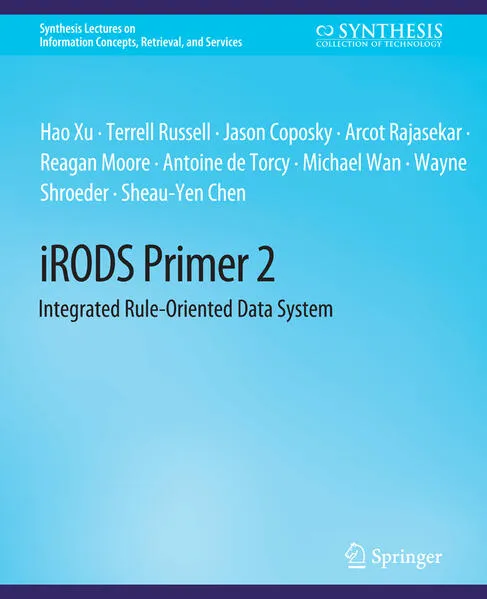
- Publikationen ca: 1
- Gefolgt von 1 Nutzern
- Fragen & Antworten
Xu, Hao
Hao Xu is a research scientist at the Data Intensive Cyber Environment Center, University of North Carolina at Chapel Hill. He has been working on improving the rule engine and the rule language, and the metadata catalog of the integrated Rule-Oriented Data System (iRODS) since 2010. He developed pluggable rule engine architecture that allows interoperability between different programming languages and the iRODS data management systems. He also developed QueryArrow, a semantically unified query and update system that allows bidirectional integration of metadata from multiple heterogeneous data stores. His research interests include theory of data management, automatic theorem proving, programming languages, distributed data systems, and formal methods in software development. He has a B.E. in computer science and engineering and a B.S. minor in applied mathematics from Beihang University and a Ph.D. in computer science from University of North Carolina at Chapel Hill.Terrell Russell is serving as the Chief Technologist of the iRODS Consortium at the Renaissance Computing Institute (RENCI). Terrell works on build and test for iRODS as well as code review, package management, documentation, and high-level architecture design. He's interested in distributed systems, metadata, security, and open source software that accelerates science. Terrell holds a B.S. in computer engineering, a B.S. in information technology and service organizations, an M.S. in computer networking from North Carolina State University, and a Ph.D. in information science from the University of North Carolina at Chapel Hill. Terrell has been working on iRODS since 2008.Jason Coposky is the Executive Director of the iRODS Consortium at the Renaissance Computing Institute (RENCI). With over 20 years of industry experience, Jason has worked in a variety of areas including virtual reality, EDA, visualization, and data management. Prior to RENCI, Jason was Technical Director for a startup where he developed projection and distortion correction technologies. During his tenure at RENCI, he began as the first member of the Visualization team, creating novel large format display and multitouch systems. He then moved to the irods@renc114 project as technical lead where he later became Chief Technologist of the iRODS Consortium. In his current role, he provides management oversight for the entire Consortium.Arcot Rajasekar is a professor in the School of Library and Information Sciences at the University of North Carolina, Chapel Hill, and a chief scientist at the Renaissance Computing Institute (RENCI). Previously, he was at the San Diego Supercomputer Center at the University of California, San Diego, leading the Data Grids Technology Group. He has been involved in research and development of data grid middleware systems for over a decade and is a lead originator behind the concepts in the Storage Resource Broker (SRB) and the integrated Rule Oriented Data Systems (iRODS), two premier data grid middleware developed by the Data Intensive Cyber Environments Group. Dr. Rajasekar has a Ph.D. in computer science from the University of Maryland at College Park and has more than 100 publications in the areas of data grids, logic programming, deductive databases, digital library, and persistent archives.Reagan Moore (retired) was a professor in the School of Information and Library Science at the University of North Carolina, Chapel Hill, chief scientist for Data Intensive Cyber Environments at the Renaissance Computing Institute, and director of the Data Intensive Cyber Environments Center at University of North Carolina. He coordinates research efforts in development of data grids, digital libraries, and preservation environments. Developed software systems include the Storage Resource Broker data grid and the integrated Rule-Oriented Data System. Supported projects include the National Archives and Records Administration Transcontinental Persistent Archive Prototype, and science data grids for seismology, oceanography, climate, high-energy physics, astronomy, and bioinformatics. An ongoing research interest is use of data grid technology to automate execution of management policies and validate trustworthiness of repositories. Dr. Moore's previous roles include the following: director of the DICE group at the San Diego Supercomputer Center, and manager of production services at SDSC. He previously worked as a computational plasma physicist at General Atomics on equilibrium and stability of toroidal fusion devices. He has a Ph.D. in plasma physics from the University of California, San Diego (1978), and a B.S. in physics from the California Institute of Technology (1967).Antoine de Torcy is a developer with the iRODS Consortium. He worked with the DICE group since 2003, at the University of California, San Diego, until 2008, and now at the University of North Carolina, Chapel Hill. Antoine has implemented client interfaces for SRB and server modules for iRODS. His technical expertise has helped various groups build preservation environments based on iRODS and focused on data and metadata. Antoine holds an engineering degree in applied mathematics and computer science from the University of Paris–Dauphine.

iRODS Primer 2
Policy-based data management enables the creation of community-specific collections. Every collection is created for a purpose. The purpose defines the set of properties that will be associated with the collection. The properties are enforced by management policies that control the execution of procedures that are applied whenever data are ingested or accessed.